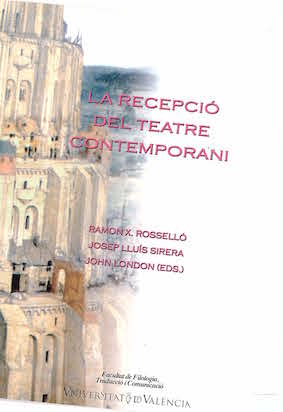Presentació
DOI:
https://doi.org/10.7203/qf-elit.v15i0.3975Paraules clau:
Teatre Contemporani Europeu, Recepció del teatre, segona meitat del s.XX Resum
Resum
Aquest nou volum de la revista Quaderns de Filologia. Estudis literaris se centra en la recepció teatral des de la segona meitat del segle XX en l’àmbit europeu. Aquest fou, en un sentit ampli, l’eix temàtic triat pels seus editors. El resultat són 12 articles procedents de diferents universitats de l’Estat Espanyol i del Regne Unit, mitjançant els quals se’ns ofereix una mostra diversa al voltant de la recepció teatral, no només centrada en aquests territoris, i amb la consideració de llengües diferents (anglés, espanyol, català, basc, alemany, francés...), on la traducció, la crítica, els mitjans de comunicació i la interrelació de models, autors, temàtiques, etc., hi ocupen un lloc primordial.
 Descàrregues
Descàrregues
Descàrregues
Com citar
-
Resum156
-
PDF (Español)60
Número
Secció
Llicència
 Este obra está bajo una licencia de Creative Commons Reconocimiento-NoComercial-SinObraDerivada 4.0 Internacional.
Este obra está bajo una licencia de Creative Commons Reconocimiento-NoComercial-SinObraDerivada 4.0 Internacional.
Tots els documents inclosos a OJS són d'accés lliure i propietat dels seus autors i/o institucions editores, i per tant, qualsevol acte de reproducció, comercialització, comunicació pública o transformació total o parcial necessita el consentiment exprés i escrit d'aquests.
________
Authors who publish with this journal agree to the following terms:
- Authors retain copyright and grant the journal right of first publication with the work simultaneously licensed under a Creative Commons Attribution License that allows others to share the work with an acknowledgement of the work's authorship and initial publication in this journal.
- Authors are able to enter into separate, additional contractual arrangements for the non-exclusive distribution of the journal's published version of the work (e.g., post it to an institutional repository or publish it in a book), with an acknowledgement of its initial publication in this journal.
- Authors are permitted and encouraged to post their work online (e.g., in institutional repositories or on their website) prior to and during the submission process, as it can lead to productive exchanges, as well as earlier and greater citation of published work (See The Effect of Open Access).




